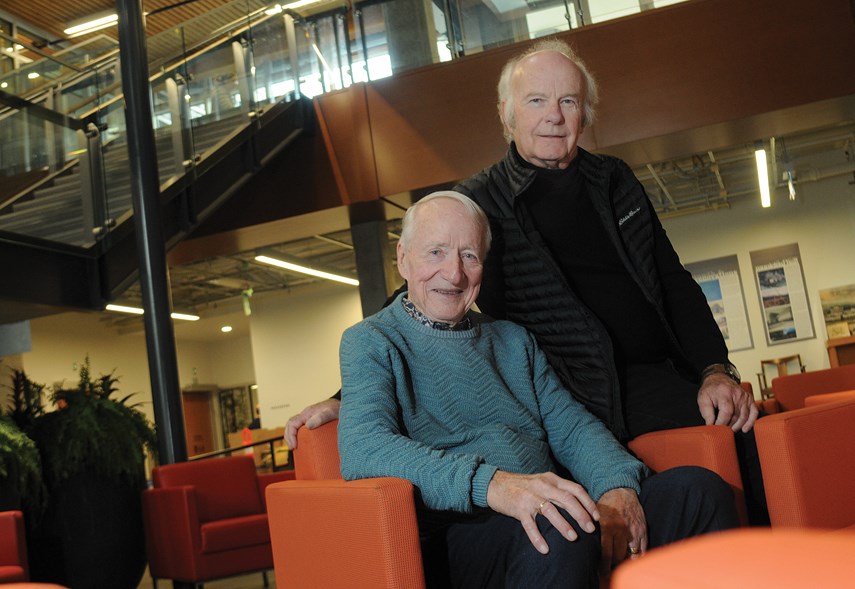A conversation with Steve Nicholls and Rod Day is like a master class in civic government – West Vancouver style.
Nicholls’ years of service in West Van, as senior planner and as director of planning, lands and permits, ran from 1979 to 2009. Day was a councillor and member of community advisory groups from 1982 to 2012.
They worked closely together during a period of change and innovation that laid a foundation for the community West Vancouver is today.
During this time, the municipality pioneered in forging new policies in community planning, area planning and density transfer, green belt and creek preservation, and waterfront and parks acquisition.
Sometimes, their roles as civil servant and councillor meant Nicholls and Day would be on opposite sides of an issue. More often, their goals and interests were aligned. No matter what side of the fence they were on, they had the community’s best interests at heart.
“In our community, planning is involved in all the components of a municipal government – development, finance, lands, parks, recreation, engineering and social planning. Here, people who will be affected by planning decisions can be actively involved with the process, and they are,” says Nicholls.
“Beginning with the 1980 community plan, and for the next 29 years, I was directly involved in every planning issue,” he recalls. “The benefit that comes from working in a smaller community is that planning involves direct contact with the people affected. Working directly with politicians, business people and citizens made the job fun and rewarding. And I was blessed with excellent, devoted mayors and councils.”
Born and raised in Toronto, Nicholls started his working life in real estate investment analysis. It was the 1960s, John Sewell was an activist alderman en route to the mayor’s office. Resistance to traditional public housing projects proposed for neighbourhoods like Cabbagetown was on the rise.
Progress on these fronts inspired Nicholls to move into community organizing, and to acquire a post-graduate degree in planning. From there, it was a short step to his chosen career, which he began as a neighbourhood planner for the City of Toronto.
After some years in the big city planning trenches, Steve embarked on what he calls his first retirement, departing from Vancouver on a backpacking adventure through eastern Asia and India. On his return to Canada, Nicholls made Vancouver (“the city I most admired”) his home and set about looking for work.
On the strength of an interview with Bob Collier and Terry Lester at the District of West Vancouver, Nicholls was handed a key to the district hall and asked when he could start as senior planner, and back then, the sole planner, working with Barbara Reid, the sole social planner. With the departure of Dr. Collier in 1984, Nicholls became director of planning and development.
“The challenge, as always in West Vancouver, is to achieve a high level of service with a limited tax base. We achieved this by translating innovative approaches to community issues into policy and action. This could not happen without the participation of the citizens of West Vancouver,” he says.
West Vancouver has a history of community participation which Nicholls will discuss in his talk. In the fairly recent past, we can look at the Citizens Planning Forum.
The forum, says founding member Day, was established in the 1970s to ensure West Vancouver would continue as a well-planned and livable community. The forum’s first challenge was proposed development along the waterfront, countering the community’s vision of a waterfront walking path.
“Today,” says Day, “thanks in large part to the vision and leadership of Don Lanskail, we have unobstructed waterfront along the sea walk from Ambleside to Dundarave.”
One could describe the sea walk as a very long, narrow park.
The forum met quarterly with council to discuss planning and development, laying the groundwork for the current system of community consultation through advisory committees and working groups.
“West Vancouver residents have high expectations, they are well informed, and they want to participate in shaping the community’s future,” says Nicholls. “They have the skills, expertise and the commitment to do so.”
Both men are retired now. They keep in touch through their continued service to the community. Nicholls is on the district’s Neighbourhood Character Working Group and the Lower Caulfeild Heritage Advisory committee. Day, a longtime member and current president of West Vancouver Historical Society, is writing a book about his years in municipal government.
They will meet again when Nicholls speaks to West Vancouver Historical Society about municipal planning as it shaped West Vancouver as we know it today. Everyone is welcome to attend on Nov. 20 at 7:30 p.m. at West Vancouver Seniors’ Activity Centre.
For more information, get in touch with the society at 778-279-2235 or at wvhs.ca.



